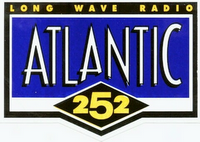In the spirit that this blog is home to content posted elsewhere, I wrote this earlier on Facebook.
UK Radio geeks always remember 1 September

I don’t remember the pirate radio ships of the 60s; my introduction to the world of the wireless came from the back of an AA Member’s Handbook where all Britain’s local radio stations were listed. In 1979 that list was probably fewer than two pages. The majority of UK radio listening was to national networks and the BBC hand a monopoly on those. The English service of Radio Luxembourg suffered on AM at night. It was only ever “the great 208” when I was on holiday in France, being the only English language radio station I could find.
Local radio was made up of a handful of BBC stations in a fairly random collection of towns and the fledgling Independent Radio Network. Where I lived, BBC Radio Blackburn (from 1981, Radio Lancashire) was our nearest BBC local and Piccadilly from Manchester and Radio City from Liverpool vied for their place as the North West’s biggest station. When I was nine years old, Piccadilly won because the Pete Baker breakfast show had the best jingles.
Today, with wall-to-wall pop hits on TV and radio channels (as well as all the world’s music available in a single app or on-demand videos from YouTube), it’s unimaginable that until 1988 needle time rules prevented broadcasters playing more than a few hours of recorded music. All radio was filled with speech and specialist programmes, or royalty free soundalike covers.
In 1984 somebody took a ship with a transmitter on it out into international waters in the North Sea and launched a 1980s version of the pirates, Laser 558. By then I was living in Shrewsbury and the signal was just about strong enough. Outside of the music rules – and really, outside of most of the broadcast law – it played non-stop pop hits for most of the day. Sadly, it didn’t last long.
In 1989 the Irish state broadcaster, RTÉ, teamed up with the Radio Luxembourg owners, RTL, to create a pop music station with a powerful AM transmitter that reportedly could reach over 40 million people.
On 1st September 1989, from somewhere in Ireland, Atlantic 252 launched an all-day pop format which was unique: there was nothing quite like it on the air. You know the station had an impact because, on this day each year, somebody, somewhere, writes a note about it to commemorate the day. I first did it in 2004 but I see no reason not to do it again.
I guess the station’s peak was the early 1990s. By the mid-90s radio across the UK was able to play more and more music and FM was everywhere. It didn’t stop people launching AM stations. On this day (1st September) in 1994, Country 1035 launched on AM in London and lasted a few years (also, in later years, with input from RTL). It doesn’t seem to have had quite such an impact because you don’t find too many people commemorating that launch each year.